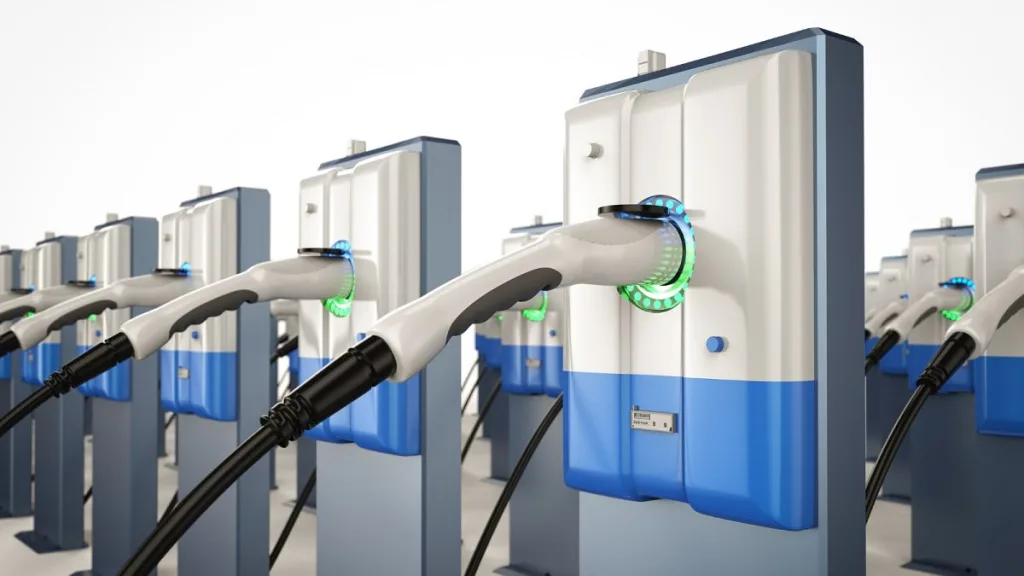The concern about battery degradation from frequent fast charging is a top worry for new electric vehicle (EV) owners. However, many factors contribute to whether fast charging is genuinely detrimental to battery health.
Welcome to The Switch, Euronews Next’s latest mobility series for those on the verge of transitioning to an EV.
As the shift towards electric vehicles accelerates amid climate change pressures and economic uncertainties, we’re here to support you in transitioning from fossil-fueled cars to electric alternatives.
Each week, we provide expert advice, insights, and aim to clarify misconceptions surrounding electric vehicles.
For numerous individuals, electric vehicles (EVs) symbolize the future of transportation and a vital means of cutting emissions. However, with this evolution come new maintenance considerations.
A primary concern is whether frequent use of direct current (DC) fast charging damages EV batteries over time.
While early industry insights warned that regular fast charging could reduce battery longevity, recent studies are challenging this perspective, especially for models with sophisticated battery management systems.
New Insights on Fast Charging
A recent study conducted by Recurrent examined data from over 13,000 EVs to evaluate the effects of frequent fast charging. Surprisingly, data from 160,000 real-world charging sessions indicated no significant difference in battery range degradation between Teslas that often utilize fast charging and those that use it less frequently.
Nevertheless, the study focuses mainly on newer EV models (2018 and up, with a majority from 2021 onwards), thus casting uncertainty on the long-term impact of fast charging. It’s important to note that like all lithium-ion batteries, EV batteries naturally experience gradual range loss over time, with Teslas demonstrating expected range degradation irrespective of charging frequency. Factors such as terrain and weather conditions can also influence real-world range loss.
How New EVs Mitigate Battery Degradation
Modern battery and thermal management technologies have advanced significantly, enabling many EVs to manage fast charging without substantial degradation.
One key factor is the advanced battery management system (BMS), which continuously monitors and regulates each cell’s voltage, current, and temperature in real time. This monitoring ensures that these parameters remain within safe limits, preventing overheating or overcharging. If temperatures rise excessively, the BMS either slows charging down or activates cooling systems to preserve battery health.
Heat is detrimental to battery performance, particularly during rapid charging. Today’s EVs employ thermal management systems (TMS) — such as liquid cooling or air conditioning — to maintain stable battery temperatures, ultimately reducing the stress that fast charging may impose.
For instance, liquid cooling systems enable cells to stay cool even throughout extended fast charging sessions. Coupled with BMS technologies, TMS helps to set current limits and mitigate risks such as thermal runaway, enhancing both battery longevity and the safety and efficiency of fast charging.
Battery chemistry plays a significant role as well. Different types of batteries possess varying abilities to withstand fast charging. Lithium Iron Phosphate (LFP) batteries, commonly used by Tesla and others, exhibit impressive durability under rapid charging conditions. Conversely, Nickel Manganese Cobalt (NMC) batteries tend to be more susceptible to wear, especially in high-temperature situations. Nevertheless, automakers are making progress with both chemistries, utilizing BMS technologies to alleviate some of the stress caused by fast charging.
When Fast Charging May Stress EV Batteries
While fast charging is typically safe for most EVs, certain conditions can adversely affect battery lifespan.
Charging in extreme temperatures, whether excessively hot or cold, can heighten battery stress, especially if preconditioning isn’t applied beforehand. Data from Geotab indicates that charging in high temperatures can significantly accelerate battery degradation.
In addition, charging from very low or nearly full battery levels can create resistance that contributes to degradation, making it wise to avoid fast charging when your battery is extremely hot, frigid, or at high or low charge states.
This is why many manufacturers recommend steering clear of fast charging when the battery is nearly empty or near 100 percent charged.
High mileage can be another factor to consider. Vehicles subjected to frequent fast charging every day may show slightly more wear, but with a well-functioning BMS, the impact is normally minimal.
Consistently charging to full capacity (100 percent) adds more stress to the battery than capping it at 80 percent, given that the final charging phase usually increases cell temperatures. To optimize battery lifespan, many manufacturers suggest limiting fast charging to about 80 percent.
Furthermore, preconditioning the battery — warming it up or cooling it down to the ideal temperature prior to charging — can facilitate a smoother charging process. Fast charging without this preconditioning, particularly in extreme temperature settings, can be more damaging.
Top Tips for Reducing Battery Degradation
To further protect your EV battery during fast charging, consider these suggestions:
- Precondition the battery in extreme weather conditions before charging.
- Avoid charging to 100 percent regularly; aim for around 80 percent instead.
- Balance fast charging with slower Level 2 charging whenever possible.
- Adhere to manufacturer guidelines for optimal charging practices.
The Future of Fast Charging
Recent studies suggest that frequent fast charging may not significantly harm EV batteries, directly challenging past assumptions. Today’s electric vehicles are equipped with sophisticated BMS, advanced thermal management systems, and resilient battery chemistries like LFP to combat potential degradation.
Ultra-fast charging stations, soon capable of exceeding 350 kW, may dramatically shorten charging times, allowing users to reach 80 percent in roughly 15 minutes.
With continual advancements in lithium-ion, solid-state, and lithium-sulfur battery technologies, combined with smart charging infrastructures, electric vehicles are on track to become faster, safer, and more reliable to charge.
Geraldine Herbert serves as the motoring editor for the Sunday Independent newspaper and is an expert in e-mobility.
Photo credit & article inspired by: Euronews



